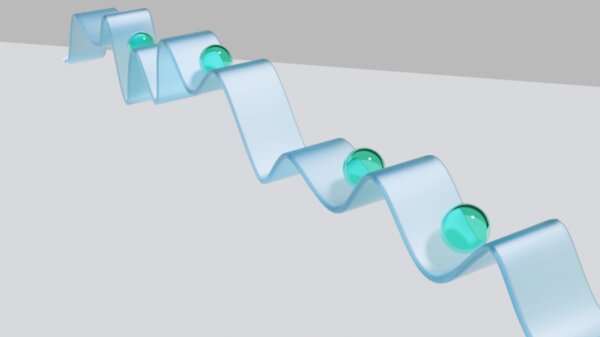Image of a random quantum system. Credit: Kazuya Fujimoto
In physics, "universality" refers to properties of systems that are independent of their details. Establishing the universality of quantum dynamics is one of the key interests of theoretical physicists. Now, researchers from Japan have identified such a universality in disordered quantum systems, characterized by a one-parameter scaling for surface roughness and entanglement entropy (a measure of quantum entanglement).
Many-particle systems in the real world are often imbued with "disorder" or "randomness." This, in turn, leads to the occurrence of phenomena unique to such systems. For instance, electrons in strongly disordered systems can become localized due to destructive interference, a phenomenon known as "Anderson localization."
Anderson localization has been studied extensively in terms of one-parameter scaling, where system properties are scaled based on one specific parameter. But while most studies have focused on static properties, disorder can also significantly influence quantum dynamics such as entanglement dynamics and transport phenomena.
In a recent study published in Physical Review Letters, a team of physicists led by Prof. Kazuya Fujimoto from Nagoya University has now demonstrated numerically a dynamical one-parameter scaling called "Family-Vicsek (FV) scaling" for disordered quantum systems. "While the FV scaling is originally known from classical surface growth, we found the scaling in random quantum systems by introducing a 'quantum surface height operator,'" explains Prof. Fujimoto.
In their study, the physicists considered a system of non-interacting spinless fermions in a disordered one-dimensional potential for three common models. They found that the surface roughness followed FV scaling characterized with three exponents. Further numerical analysis showed that the surface roughness could be related to the entanglement entropy (EE), thus indicating an FV-type scaling for EE. In addition, they observed anomalous scaling exponents for one of the models and attributed it to the presence of localized states in a delocalized phase, a classic signature of quantum disordered systems.
Importantly, surface roughness can be measured experimentally for cold-atomic systems using microscopy techniques, which makes the experimental estimation of EE viable in non-interacting fermions.
"These findings will deepen our understanding of nonequilibrium physics and provide a novel viewpoint to classify the universal non-equilibrium phenomena emerging in random quantum systems," says Prof. Fujimoto.
While the findings of the study do not have a direct influence on our daily lives, they certainly pave the way for a better understanding of real-world quantum systems.
More information: Kazuya Fujimoto et al, Dynamical Scaling of Surface Roughness and Entanglement Entropy in Disordered Fermion Models, Physical Review Letters (2021). DOI: 10.1103/PhysRevLett.127.090601
Journal information: Physical Review Letters
Provided by Nagoya University
























